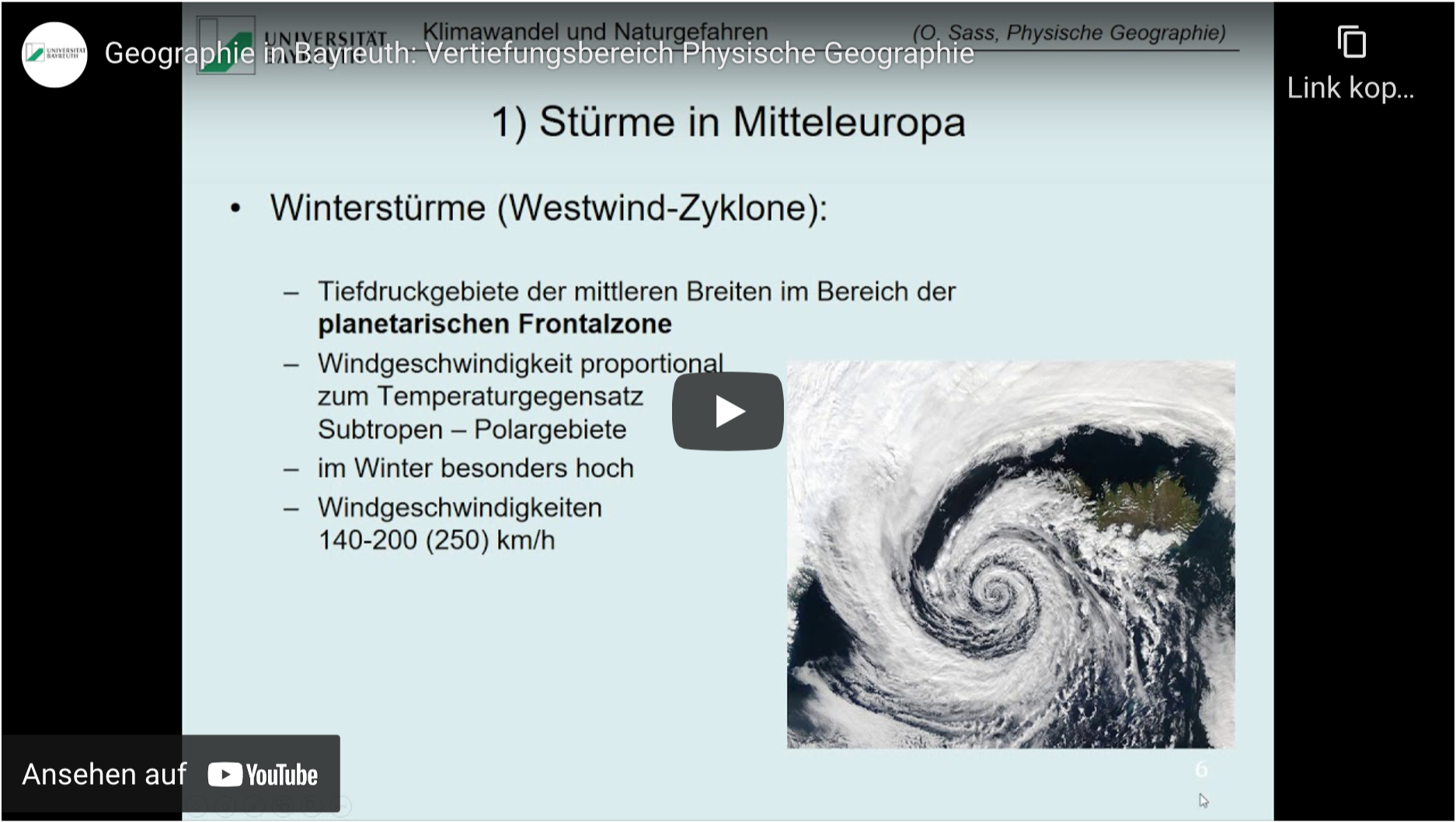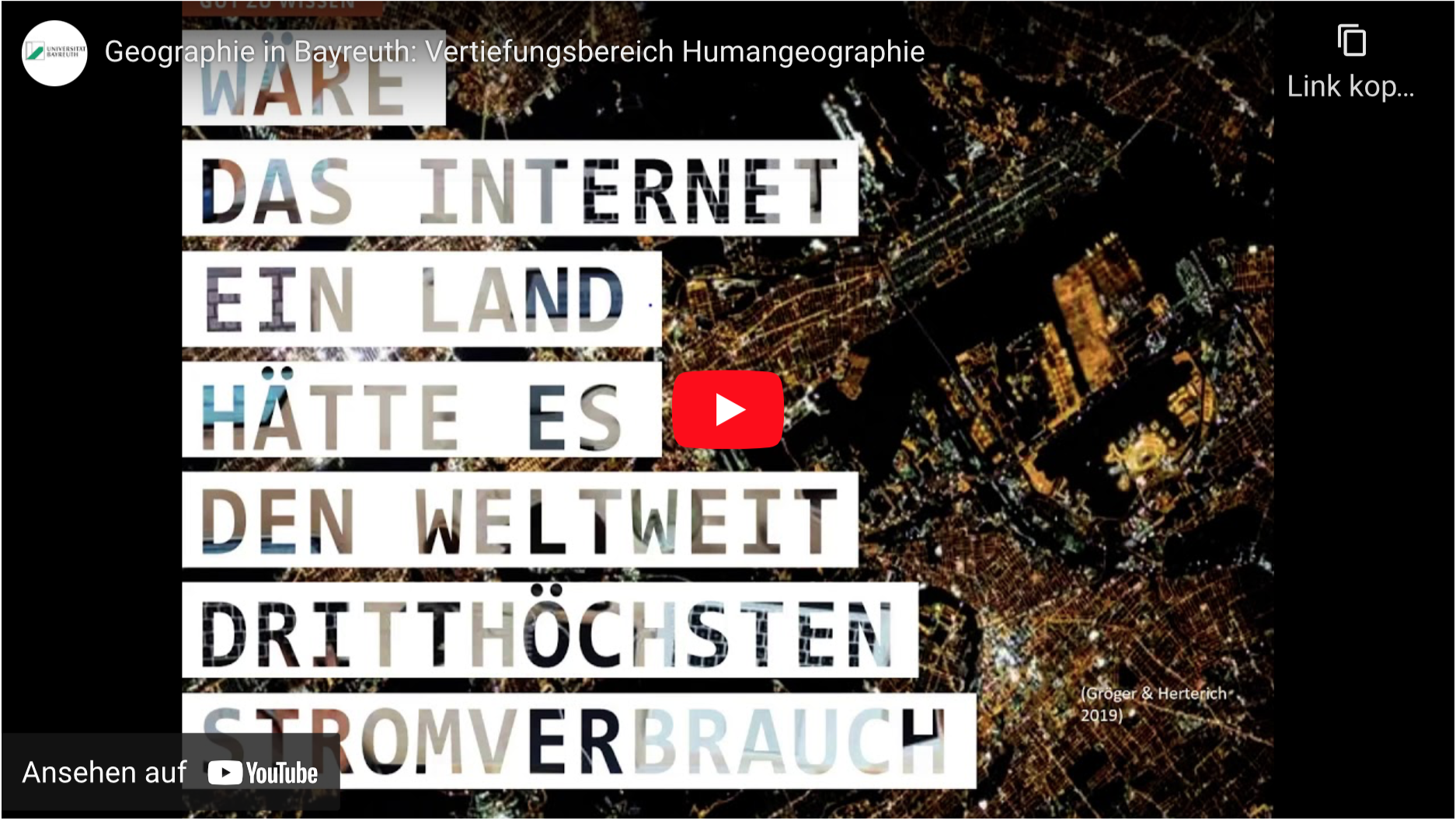The subject of geography has a broad spectrum of content ranging from natural science to economic and social science issues. Reference to spatial processes and interdisciplinary themes are characteristic.
The topics dealt with in geography at the University of Bayreuth include, for example, the causes and effects of climate change, the effects of demographic change, studies on economic development differences between regions or on resource conflicts. Thus, geography makes an important contribution to spatial planning and politics.
Presentation of the study programme - Prof. Matthew Hannah
We need your consent to load content.
In order to show videos we use the services of third-party providers. These providers can collect data about your activities. Further details can be found under “Learn more”.The most important at a glance
- Structure and content of the study programmeHide
-
The study programme lasts 6 semesters and is divided into modules (including Bachelor thesis and professional internship), in which a total of 180 credit points must be earned. The Bachelor's examination is completed during the course of study by graded, course-specific examinations and the final Bachelor's thesis.
Structure of the 1st to 4th semester:
Subject-specific key qualifications (e.g. cartography, geo-information systems)
Fundamentals of human geography (e.g. social geography, economic geography, urban and regional development)
Basics of physical geography (e.g. geomorphology, climatology)
Regional geography (e.g. Germany, Europe) with a 10-day field exercise (e.g. Alps, Ukraine, Iceland, USA, Tajikistan, Namibia, Brazil)
Structure of the 5th to 6th semester:
Self-selected specialisation: either "human geography" (e.g. urban and regional development, cultural geography, political geography) or "physical geography" (biogeography, geomorphology, climatology)
Completion: Bachelor thesis with own investigation (Guide to registering the bachelor thesis)
Contextual subject
You also choose a contextual subject from an extensive range (e.g. languages, business or economics, public law (municipal and building law), public law (environmental law), sociology, applied computer science, biology/geoecology or meteorology).
Teaching and service delivery
The contents are not only taught in lectures, but are also applied and deepened in associated seminars and exercises as well as on field exercises (individual days and a large one lasting at least 10 days) and in a professional internship.
You will complete coursework through papers/presentations, assignments, written and oral examinations, group work and exercises.
Please note for module K (colloquium): You demonstrate your presence at the presentations by collecting signatures in your colloquium pass. If you have attended the required number of lectures, the module will be booked as "passed" in cmlife on 1 March and 1 August each year if the completed colloquium pass is submitted to Jasmin Samimi.
You complete the programme with a Bachelor of Science degree that qualifies you for a profession. This can be followed by a Master's degree.
You will find detailed information on your studies in the module handbook and in the study and examination regulations:
Start of studies from WS 21/22
Start of studies from WS 19/20
Start of studies before WS 19/20
- Professional internshipHide
-
The 8-week internship, involving activities that must have a clear geographical reference, can be completed in the lecture-free period after the 3rd semester up to the 6th semester in a maximum of 2 sections of 4 weeks each at companies, public institutions or not-for-profit organizations and initiatives.
Recognition of your internship
At the latest six weeks before the start of the internship, you must submit an informal application for recognition of your planned activities (§3, paragraph 2 of the study and examination regulations).
To do this, you must obtain confirmation of the nature of the planned activities from the office where you would like to complete the internship. It is not sufficient to state "project work"; the projects and activities must be named. Send this confirmation as an attachment to your application e-mail to Ms. Samimi. You will usually receive an answer within 2 to 3 days as to whether your internship has been accepted or not.
If you need a confirmation for your internship that it is a mandatory internship, you will get this confirmation from the internship officer of the examination board, Ms. Samimi.
Internship confirmation
After the internship, you have to get a confirmation (work certificate) from the place you did your internship and prepare a 2 to 5-page report. Please use this cover sheet for this purpose. Both must be submitted to Ms Samimi by email as a pdf within 3 months. In the report, you should describe your activities and experiences during the internship in as much detail as possible. You will receive feedback after about 2 to 3 weeks. Your internship will only be recognised if your report is in order.
Further information
Please read the regulations for the professional internship (Appendix 3 to the examination and study regulations). There you will also find information about the areas in which the internship can be carried out.
If you have any questions, please contact Ms Samimi during office hours or by email.Please note: Recognised professional internships are entered as "passed" in cmlife for the module BP (Professional Internship) on 1 August and 1 March for those who have successfully completed a total of 8 weeks of internship by the respective semester. The entire application and recognition as well as the booking in cmlife is handled exclusively by Ms Samimi.
- Application/AdmissionHide
-
The degree programme is not subject to admission restrictions. An application is not necessary; the programme can only begin in the winter semester. You can enrol at the Registrar's Office for the winter semester according to the university's internal deadlines
- Professional fieldsHide
-
The Bachelor's degree programme Geography: Society and Environment opens up a wide range of professional fields due to the broad subject-specific and methodological education, which can be individually deepened in geography and via contextual subjects. The study programme is problem- oriented, interdisciplinary and practice-oriented. The professional internship anchored in the curriculum enables students to gain initial professional experience. Graduates of the Institute of Geography work, for example, at environmental authorities, planning offices, in development cooperation and political consultancy.
Lea Gulich - Public Participation Officer at TenneT TSO GmbH
"Geography?! What can you do with that?!" I was often asked that.
From today's perspective, my geography studies in Bayreuth and the subsequent entry into professional life have given me a broad wealth of experience. In the course of my Bachelor's and Master's degree, I focused my studies on participation in regional development - whether from an economic or planning perspective.My career entry was made possible by a planning office for urban and regional development, which I got to know during my final thesis. The focus was on the development of smaller communities and the shaping of local development with the citizens. Participation in planning and development processes also led me to my current professional field: As a public participation officer at TenneT TSO GmbH, I am the contact person for citizens, a wide range of institutions and public interest groups on issues relating to Bavarian grid expansion projects. In grid expansion, TenneT, as one of the four German transmission system operators, is caught between legal and planning requirements on the one hand and the concrete needs of the local population on the other. Both have to be taken into account and reconciled in the planning process. This is challenging and exciting at the same time.
Throughout my studies, I particularly enjoyed the informal atmosphere, the excellent supervision (the lecturers always had an open ear!), the opportunities to help shape the framework conditions and the broad knowledge imparted (from soil science to environmental law). I can therefore highly recommend studying at the Department of Geography.
Dominik Hartmann - City Centre Coordinator and Head of Tourist Information
From 2008 to 2014, I studied at the Department of Geography at the University of Bayreuth, first for a Bachelor's degree in Geography and then for a Master's degree in Human Geography - Urban and Regional Research. Especially the close contact to the lecturers and professors was a weighty argument for me to study geography in Bayreuth. Thanks to the well-founded and wide-ranging education I received during this time, I also had an easy transition into professional life. Even while I was writing my Master's thesis, I worked as a territory manager for the bicycle manufacturer CUBE. After completing my Master's thesis, I started working as a public service employee for the city of Marktredwitz in spring 2015. As city centre coordinator, I am responsible for the areas of city marketing, event management and area management. Since autumn 2015, I have also been in charge of the tourist information office of the city of Marktredwitz, so that I am now also responsible for the area of tourism. This broad range of tasks guarantees a varied and exciting everyday working life, for which I was optimally prepared through my studies.
http://www.marktredwitz.de/im-rathaus/stadtverwaltung
Sascha Jackisch – research assistant at the LMU München
After my bachelor's degree in geography at the LMU Munich, with a focus on anthropogeography, I decided to take the master's programme "Human Geography Urban and Regional Research" at the University of Bayreuth. The research-oriented structure of the Master's programme and the strong focus on human geography were particularly important to me. For example, the two one-semester and two- semester study projects teach important soft skills such as teamwork, personal responsibility and time management in addition to essential methodological content. Within my Master's programme in the attractive university city of Bayreuth, I had the opportunity to focus on economic geography topics and thus to contribute and further deepen my professional interests during my studies. In addition, I was able to gain work-relevant experience alongside my studies as a student trainee at the municipal consultancy KlimaKom and as a student assistant at the University of Bayreuth. After graduating, I am now (well prepared) working as a research assistant at the LMU Munich in the Department of Economic Geography and Tourism Research, where I am doing my doctorate and miss the excellent Bayreuth canteen almost every day.
Sascha Köpf - Regional manager of the region "Around the Neubürg“
After completing my Bachelor's degree in Geography at the Philipps University of Marburg, I transferred to the University of Bayreuth in 2013 for the Master's programme "Human Geography - Urban and Regional Research". The main reason for the change was the focus of my studies, which was in line with my interests. Since the beginning of my studies, my interests have been in the development of rural areas. During my studies I was able to learn the necessary "tools" for this. In addition to the elective modules on "human geographic methods and working techniques", it was the study project, which ran for two semesters, that provided many practical skills to complement the theoretical basics. The fieldwork also enabled me to establish initial contacts and networks.
Towards the end of my studies, I did a voluntary internship semester and worked at the Bayreuth Office for Economic Development and Regional Management. This also resulted in the topic for my Master's thesis, which dealt with the shortage of skilled workers in the Bayreuth region and derived recommendations for action.
After completing my studies, I started working as a regional manager for the region "Around the Neubürg", consisting of two towns and eight communities in the western district of Bayreuth. My task is to further develop the rural region and make it fit for the future by initiating new and continuing existing projects in the areas of tourism, economy, infrastructure and services of general interest. I am also responsible for the management of the association.
http://www.neubuerg-fraenkische-schweiz.de bzw. https://de-de.facebook.com/neubuerg
Johannes Schnabel – Sales Manager at ENERCON
After my bachelor's degree in geography, I focused mainly on the topic of renewable energies in my master's degree programme in Human Geography - Urban and Regional Research at the University of Bayreuth. In conjunction with an interest in geographical theories, the topic of my Master's thesis emerged: "Acceptance of wind turbines from a discourse-theoretical perspective".
After completing my Master's degree in 2011, I initially worked for 2.5 years at the association Energievision Frankenwald e.V. and was able to contribute to the development of so-called bioenergy villages as project manager of a LEADER-funded cooperation project of the districts of Hof, Kronach and Kulmbach.
After a short stopover at the Office of Agriculture as a project worker for heating grids, I started in 2014 as a sales manager at the company ENERCON - the largest German manufacturer of wind turbines.
The incredible breadth of the geography degree helped me in all these stations.Today, it is above all the content of project management, spatial planning, GIS and also the contextual subjects taken, such as business studies and law, that help me in my daily work of project development and sales.
Jochen Weiland - Junior Project manager for individual GIS solutions at AED-SICAD
My broad interest in environmental systems, cultural diversity and human-environment interactions, as well as their analysis and modelling, sparked my interest in the Bachelor's degree programme in Geography at the University of Bayreuth. This degree programme provided me with a broad basic study programme in which the most important disciplines of geography are introduced and a subsequent specialisation area in which the focus is placed on individual desired disciplines. However, the decisive factor for me was the methodological focus of this degree programme - after all, methods are the tools of a geographer.
Thanks to the wide-ranging knowledge and the techniques I learned, I was able to get a job as a planning engineer with a transmission grid operator (grid connection offshore wind energy) immediately after graduating with a Bachelor's degree. After a subsequent Master's degree (M.Sc Environmental Geography at the University of Marburg) and further activities in software development (GIS), aerospace (remote sensing) and in the automotive industry (vehicle navigation), I now work as a junior project manager for individual GIS solutions in the WebGIS sector in Munich. The Institute of Geography at the University of Bayreuth gave me a modern education and consequently a lot of career opportunities in various industries.
The Bachelor's degree programme Geography: Society and Environment is an interesting and versatile study programme that enables you to successfully deal with questions from the above-mentioned areas as well as others. The degree programme prepares you for professional work in application and research-related occupational fields..
The Bachelor´s degree programme Geography: Society and Environment in Bayreuth offers you:
a broad range of teaching through 11 chairs
sound methodological training (quantitative and qualitative practice-based methods)
a wide range of contextual subjects,
the choice of a specialisation area,
a pronounced practical relevance (e.g. through field exercises and work placements).
You want to see more?
 |  | |

